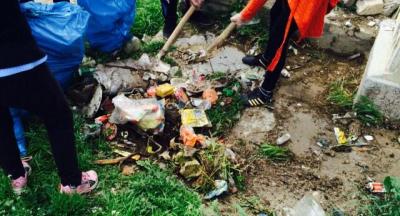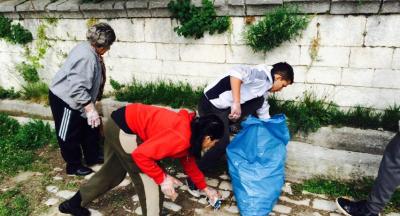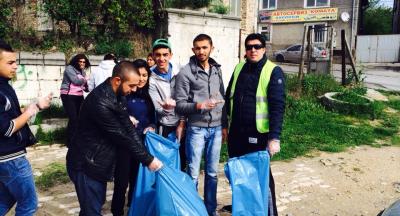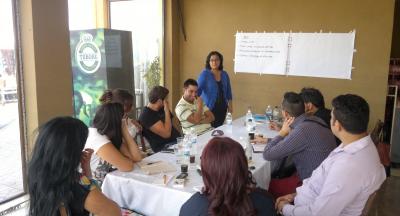Byala Slatina
*Disclaimer: The information and views set out in this page do not necessarily reflect the official opinion of the Council of Europe and/or the European Commission. Neither the Council of Europe, the European Commission nor any person acting on their behalf may be held responsible for the use which may be made of the information contained therein.
Byala Slatina is located in the North-West of Bulgaria, in a rural economically underdeveloped area of the Vratsa Province. It comprises of the town of Byala Slatina and 14 villages with a total population of 23.200. It is one of the least densely populated areas in the EU as well as Bulgaria.
Concentrated in a single neighbourhood, the Roma are the biggest minority in Byala Slatina with 2.600 inhabitants. Within the community there are several sub-groups among them are the Kalayzdhi and Reshetari. Religion in this community is also varied with the majority of Roma practicing Islam, other faiths in the community are Seventh-Day Adventists, Orthodox Christian and Evangelist Christian.
According to a World Bank study from 2014 before the end of the communist regime the vast majority of Roma living in Byala Slatina considered themselves better-off and closer to the ethnic-Bulgarian citizens. Since 2014 an important number of young Roma have emigrated to take advantage of new opportunities for income and the different opportunities that other countries can offer for their families. Another notable current reality is that the number of university graduates among the local Roma has increased in the last years and this has had a positive impact on the political participation of the community. The Roma population are active participants in elections and they are traditionally represented in the Local Council. Presently, there are 4 Roma Councillors in the City Council of Byala Slatina.
The ROMACT Process
With the signature of the Letter of Commitment by the Mayor, on 3 October 2013, Byala Slatina joined ROMACT. The Community Action Group (CAG) was set-up with the support of the ROMACT facilitator at the end of January 2014. The CAG has a core group of 7 members, mostly women (5) who meet in a room which has been provided by the municipality. The CAG previously consisted of more members, but due to family issues, moves to seek employment opportunities and the slow progress of the last period of activities some chose to leave the committee. By the end of October 2014, the representatives of the municipality and the CAG identified and agreed the priorities to meet the development needs of the Roma community. This agreement came after two meetings of the CAG members, a round table discussion on “Improving the situation of Roma communities in the municipality of Byala Slatina” and monthly meetings organized with the Mayor.
The identified needs and priorities are addressed in the Joint Action Plan which expanded along the process. Some of the measures included in this Plan are:
EMPLOYMENT
- Create conditions for the employment of low-skilled Roma people
- Organise qualification courses for unemployed Roma people;
- Assist Participation of the municipality in the state programmes for subsidized employment;
- Develop and implement a project for a social enterprise;
EDUCATION
- Prevent school drop-outs
- Provide literacy training for Roma adults;
- Appoint school mediators in schools and kindergartens;
- Reduce/eliminate kindergarten fees for poor Roma and non-Roma families;
- Create a club of "Roma customs and culture" in the Roma neighbourhood;
HEALTHCARE
- Improve the health status of Roma
- Participate in national programs to provide prophylactic examination for Roma people lacking health insurance;
- Conduct health-related discussions with Roma people;
- Distribute information materials, brochures etc.;
- Design and implement a social service project - "A baby kitchen";
INFRASTRUCTURE
- Improve living conditions in neighbourhoods with the concentrated Roma population
- Implement a project for the design and construction of technical infrastructure in Roma neighbourhoods in terms of water supply, street network, sanitation;
- Provide public means of transport from the Roma neighbourhood to the city centre;
- Provide alternative accommodation in the case of forced eviction of Roma families from their homes which are illegally built or when there is a threat to their safety and health. The measures planned for completion in 2017 are:
- Needs Assessment for new housing and determining the types of possible new homes;
- Allocation of municipal land for construction.
The Joint Action Plan , which was included in the Municipal Plan for Integration of Roma 2015-2017, was adopted by the Local Council on 10 December 2014. Some of the needs identified in this document are already addressed, notably those concerning education through the project “Me and my family”, an initiative for early childhood development which is supported by the Ministry of Labour and Social Policy. Currently, as a direct result of the project, a building has been renovated and refurbished. The targeted beneficiaries of these services are 2.825 children and 630 parents.
The CAG and the municipality cooperated on different aspects, jointly identified and solved various issues, particularly those concerning the infrastructure for the neighbourhood. As a result of this work,
- Street lights were installed;
- The graveyard was cleaned and speed bumps were installed on the streets;
- Free of charge premises to be used as an office and meeting place for the CAG were provided by the municipality.
The Municipality benefited from ROMACT expertise to apply for the following projects :
The expertise provided by ROMACT for municipalities involves training and guidance on preparing project proposals and implementing inclusive policies aimed at improving the living conditions and social integration of vulnerable populations, including the Roma.
* Alternative for children during the pandemic N: 35-26.06.2020, IRIS Fund, Bulgarian Donors' Forum, the National Network for Children and the Workshop for Civic Initiatives Foundation
Status: rejected
* Socio-economic integration of vulnerable groups and integrated measures to improve access to education - Funded by the ESF.
Beneficiaries : 700
Budget : 750 000€
Status : approved
Trainings provided by ROMACT experts :
Community Action Groups (CAG):
* NGO management and organizational development;
* Project management and planning;
* Role and meaning of NGOs for an active civil society & working for public benefit;
Local Authorities (LA):
* Address registration for persons who do not own legal home;
* Monitoring & Evaluation of a Municipal action plan for Roma integration;
* Understand and Participate in CLLD strategies
ROMACT Small Grants Scheme :
ROMACT offers small grants scheme to support the efforts of the municipalities and Community Action Groups to respond together to the needs of the most vulnerable and to multiply the good practices across ROMACT municipalities.
Under the scheme of small grants, the following project was supported by ROMACT between May - August 2020:
Initiative to counter COVID19 pandemic – The Association Mother Center Alternativa in Blaya Slatina
ROMACT supported the association with 2651 €, reaching +100 people with dire financial status from Roma community. The project provided hygiene kits, baby-care kits and essential food supplies for the families most adversely impacted by the pandemic. Active members of the community took part in the implementation of the project and actively assisted with the distribution of packages to the families in need.




